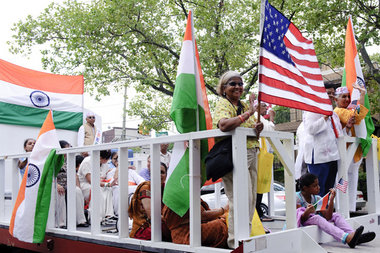
Toronto, August 13: Over 20,000 Indo-Canadians gathered in the heart of Toronto to celebrate India Day and display the country's rich heritage and cultural diversity through a traditional parade, days ahead of the Independence Day.
Despite bad weather, the day began with hoisting of the national flag by Indian High Commissioner S M Gavai on Se.
Also present on the occasion were Preeti Saran, Consul General of India; Ajit Khanna, Chair Panorama India; Harinder Takhar, Ontario Minister for Government Services; Senator Asha Seth, representatives of Federal and Provincial government and other dignitaries.
Canadian Prime Minister Stephen Harper, Ontario Premier Dalton McGuinty and Mayor of Toronto Rob Ford sent messages of greetings to mark the occasion.
In his message, Harper said: "I am pleased to extend my warmest greetings to everyone attending the India Day Festival and parade hosted by Panorama India, marking the 65th Anniversary of India's Independence."
Commending contributions made by Indo-Canadians, Harper said: "Inspired by their heritage, Indo-Canadians have brought the best of India to Canada, making valuable contributions in all fields of endeavour. Your efforts have not only helped our nation to thrive, but have deepened the bonds between our two countries."
Ontario Premier Dalton McGuinty said: "India is a nation with a vibrant culture and economy. Across the globe, people from India and those of Indian descent are making their mark in every field of endeavour. Ontario is proud to be home to a dynamic and diverse Indo-Canadian community."
The event was followed by the traditional India Day Parade which has gone green this year, as it used well- decorated hand-pulled Rickshaws instead of the gas guzzling trucks and floats.
The parade displayed the rich cultural heritage of various Indian states and Union Territories and featured dance and music with a distinctly Indian flavour.
The parade consisted of thousands of Indian people, all in traditional, colourful Indian clothing. Many women danced traditionally, twirling delicately as their bracelets jingled.
Dundas Square was flooded with women wearing traditional bright saris and people chatting in a variety of languages.
The parade took approximately an hour and travelled south on Yonge Street, West on Queen Street, North on Bay Street and then returned to the Square traveling East on Dundas.
As part of the cultural programme, performers like Amit Arya, Shweta Subram and renowned Kathak dancer Uma Sharma from India presented their programmes.
Sakshi Sharma, who for the first time witnessed the India parade, said: "They're just so excited to see the parade.
"I think it's fantastic that this event draws such a crowd because we should be celebrating different Indian cultures in a city that embraces so many people from everywhere."





Comments
Add new comment